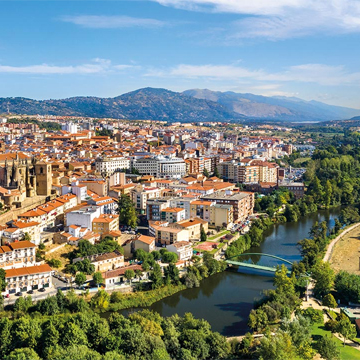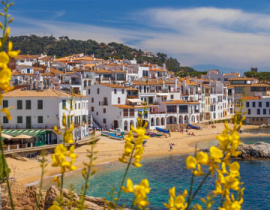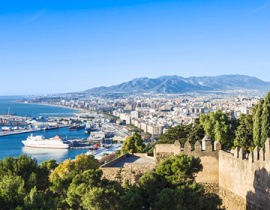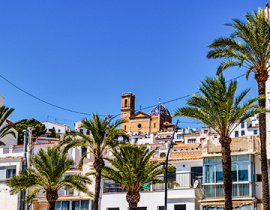- Home
- Blog
- Area Guide
- Exploring Spain: Regions, Provinces, and Property
Exploring Spain: Regions, Provinces, and Property
Spain is one of the most attractive destinations for real estate, known for its sunny Mediterranean climate, stunning landscapes, and vibrant cultural heritage. All of the regions of Spain offer something unique when you're searching for a peaceful retirement spot, a vacation home, or a smart investment opportunity. But before diving into the property market, it’s important to understand how the country is organized geographically and administratively and how culture differs in each region of Spain.
This guide, prepared by TEKCE, will walk you through everything you need to know about Spain’s regional structure by answering questions such as “How many autonomous cities and communities are in Spain?”, “How many provinces are there in Spain?”, “What is a municipality in Spain?” and so on. Finding the answers to these kinds of questions will be beneficial for you while exploring the county’s property market. Now, let’s start with the country's regions!
Understanding Spain’s Administrative Landscape: The Regions
The country is divided into 17 communities and 2 cities. If you are wondering “What are the 17 autonomous communities in Spain?”; Andalusia,  Aragon, Asturias, Balearic Islands, Basque Country, Canary Islands, Cantabria, Castilla-La Mancha, Castile and León, Catalonia, Extremadura, Galicia, La Rioja, Madrid, Murcia, Navarra, and the Valencian Community are the autonomous regions of Spain. Meanwhile, the two autonomous cities are Ceuta and Melilla. Each of these has its own government and a certain level of self-management. This division was designed to respect Spain’s intricate blend of languages, histories, and cultures, allowing each region to take charge of crucial areas like healthcare, education, and infrastructure.
Aragon, Asturias, Balearic Islands, Basque Country, Canary Islands, Cantabria, Castilla-La Mancha, Castile and León, Catalonia, Extremadura, Galicia, La Rioja, Madrid, Murcia, Navarra, and the Valencian Community are the autonomous regions of Spain. Meanwhile, the two autonomous cities are Ceuta and Melilla. Each of these has its own government and a certain level of self-management. This division was designed to respect Spain’s intricate blend of languages, histories, and cultures, allowing each region to take charge of crucial areas like healthcare, education, and infrastructure.
At the top of the administrative hierarchy are the autonomous communities in Spain, akin to U.S. states or German Länder. Each has broad legislative and executive authority, giving them significant sway over their own affairs. Next come the provinces, followed by the municipalities. These serve mainly as administrative divisions within each autonomous community in Spain.
Meanwhile, several Spain regions of interest stand out for their unique cultural, historical, and lifestyle appeal, which directly impacts their real estate markets. For instance, Andalusia is renowned for its rich Moorish architecture and vibrant traditions, making cities like Sevilla and Málaga highly sought after by buyers looking for a blend of history and Mediterranean living. The Balearic Islands, including Mallorca and Ibiza, attract those seeking luxury coastal homes and a dynamic international lifestyle. Catalonia, home to Barcelona, offers a cosmopolitan atmosphere with a thriving arts scene and strong economic opportunities, drawing both investors and residents alike.
On the other hand, the Valencian Community balances affordability with beautiful beaches and excellent infrastructure, especially around Alicante and Valencia city, appealing to retirees and families. And for those wondering what is the largest region in Spain, the answer is Castile and León, a vast inland area known for its medieval towns, Romanesque architecture, and peaceful countryside, ideal for buyers looking for space, heritage, and a slower pace of life.
At the local level are municipalities in Spain, covering towns, villages, and cities. These handle day-to-day services such as urban planning, waste management, and cultural events, keeping governance close and responsive to local needs. This is especially true for uniprovincial communities, streamlining governance and reducing bureaucracy. This arrangement streamlines governance, reducing bureaucracy and sometimes enabling quicker policy implementation. Briefly, each community manages its finances independently, with some regions able to collect and manage their own taxes. This system fosters competitiveness and innovation but also highlights differences in wealth and investment priorities across the country.
The Role of Provinces in Spain: Local Governance
Provinces are grouped within autonomous communities and serve to bridge the gap between regional and municipal  administration in this beautiful country. If you look at a “provinces in Spain map”, you’ll see how these divisions are distributed across the regions, highlighting the country’s layered administrative structure. In total, the number of provinces in Spain is 50.
administration in this beautiful country. If you look at a “provinces in Spain map”, you’ll see how these divisions are distributed across the regions, highlighting the country’s layered administrative structure. In total, the number of provinces in Spain is 50.
If you’re exploring a list of provinces of Spain, you’ll find diverse areas that vary greatly in size and character. The Valencian Community comprises three provinces, including Alicante and Castellón, which are well-known for their sunny coastlines and expat-friendly towns. Likewise, Catalonia is divided into four provinces; Barcelona, Girona, Lleida, and Tarragona, each offering a unique mix of history, architecture, and lifestyle.
Notably, the biggest province in Spain is Badajoz in Extremadura, famed for its expansive rural landscapes and historic sites. Barcelona’s cosmopolitan energy contrasts with Girona’s medieval charm or Tarragona’s Roman heritage, giving buyers a variety of settings within the same region.
Provincial councils (diputaciones provinciales) play a vital role in supporting local municipalities, especially smaller towns with fewer resources. These councils coordinate joint projects, maintain regional roads, and oversee services like public transport, healthcare centers, and rural development.
They’re also commonly used as reference points in real estate searches, making them especially important for buyers and investors. Within these provinces of Spain, there are popular geographic and tourist areas often referred to by names such as Costa Blanca or Costa Calida. These “Costas” are not official administrative regions but rather well-known coastal zones within provinces. Costa Blanca, for example, is part of the Alicante province in the Valencian Community, while Costa Calida belongs to the Murcia region. Therefore, it can be said that provinces are more than just administrative units. They’re also markers of identity and heritage.
The Best Cities in Spain for Living: Exploring the Property Market
Recognizing the role of a municipality in Spain is just as important as knowing about its regions and provinces. A municipality in Spain refers to a city, town, or village that has its own local government responsible for managing daily services, local infrastructure, and community needs. They vary greatly in size and character from small rural towns to the biggest cities in Spain. Madrid and Barcelona, which play a key role in shaping local lifestyle and real estate markets, are the largest cities in Spain.
about its regions and provinces. A municipality in Spain refers to a city, town, or village that has its own local government responsible for managing daily services, local infrastructure, and community needs. They vary greatly in size and character from small rural towns to the biggest cities in Spain. Madrid and Barcelona, which play a key role in shaping local lifestyle and real estate markets, are the largest cities in Spain.
Choosing the right location among the most beautiful cities in Spain is a key factor when relocating here, especially for expats looking to settle into a new lifestyle. Some cities stand out not only for their beauty and climate but also for the ease with which newcomers can adapt. For instance, the expat life in Málaga and Alicante continues to attract international buyers for good reason. Because Málaga offers a unique blend of Andalusian culture and modern infrastructure, with its historic city center, thriving arts scene, and Mediterranean beaches.
Alicante, on the other hand, is loved for its coastal charm, vibrant festivals, and relaxed pace of life. In both cities, expats enjoy access to excellent healthcare, international schools, and welcoming communities that make integration smoother and more enjoyable. Valencia is another city gaining attention for its balance of urban living and affordability. Known for its rich architecture, outdoor lifestyle, and delicious cuisine, this city provides a distinctly Mediterranean way of life.
The best places to buy property in Spain often include these key destinations, but individual preferences play a big role. Whether it’s the cultural depth of inland cities, the coastal appeal of the Costa del Sol, or the island lifestyle of the Canaries, each region offers distinct advantages for expats, retirees, and investors alike. So, it can be said that the country’s real estate market is just as diverse as its landscapes!
What You Should Know About the Property Types in Spain
This beautiful country offers a wide variety of properties that blend tradition with modern living, ensuring there’s something for every kind of buyer. In urban centers, apartments and flats are popular choices for those who enjoy the vibrant city life, with easy access to shopping, transportation, and social opportunities. For families or anyone looking for more privacy and space, villas and townhouses in coastal or rural areas pr ovide a peaceful retreat. Whether along the sun-soaked Mediterranean coastline or nestled among Spain’s scenic rolling hills, these homes offer room to grow and relax.
ovide a peaceful retreat. Whether along the sun-soaked Mediterranean coastline or nestled among Spain’s scenic rolling hills, these homes offer room to grow and relax.
Meanwhile, holiday homes and vacation rentals are commonly found in well-known travel destinations like the Costa del Sol, the Canary Islands, and the Balearics. These properties not only serve as perfect getaway spots but also present attractive rental income possibilities for investors. New developments and modern complexes showcase the latest amenities and energy-efficient designs, appealing to buyers who prioritize comfort, sustainability, and potential for future value growth. At the high end of the market, luxury properties and residences are typically located in exclusive neighborhoods of Madrid, Barcelona, or along the coast. That’s why living in Barcelona is ideal for those who are rich in professional opportunities and often offered high-end amenities due to its break with a cosmopolitan lifestyle.
Spanish Property Types for Every Budget: Essential Tips to Consider
If you’re thinking of investing in a property in Spain, your choice of region and property type should align with your goals. As you make your decision, you should keep these factors in mind:
- Local Governance & Regulations: Tax rates, rules for renovating, and property usage differ by autonomous community and municipality.
- Financial Incentives: Certain regions offer tax advantages, particularly for retirees and overseas buyers, improving affordability and return on investment.
- Accessibility & Infrastructure: Properties close to airports, hospitals, and public transport are more valuable and convenient for both owners and potential tenants.
- Community & Lifestyle Match: The local culture, language, and amenities can make a tremendous difference in daily comfort and satisfaction.
Turn Your Investment Dreams Into Reality with TEKCE Today!
In conclusion, this country continues to shine as a leading destination for real estate investment, offering an unmatched blend of lifestyle and value. Whether you aspire to coastal living, vibrant city life, or a solid investment return, the options are boundless.
When you are faced with so many choices, TEKCE takes over to guide you in finding the best property for you. We provide services including personalized consultations, property searches tailored to your needs, negotiation support, and assistance with all legal and financial processes to ensure a smooth and confident purchase.
Reach out to us today to find your place in Spain’s dynamic property market!
FAQs on Regions, Provinces, and Cities in Spain
Q: How many regions are there in Spain?
A: Spain is divided into 17 regions, officially known as autonomous communities, along with 2 autonomous cities.
Q: How many autonomous communities are there in Spain?
A: There are 17 autonomous communities in Spain, each with its own government and administrative powers.
Q: What is an autonomous community in Spain?
A: An autonomous community in Spain is a first-level political and administrative division, similar to a state or province, with its own government and certain legislative powers.
Q: What is the biggest region in Spain?
A: The largest autonomous community in Spain by area is Castile and León.
Q: How many provinces are there in Spain?
A: Spain has a total of 50 provinces, which are subdivisions within the autonomous communities.
Q: How many municipalities are there in Spain?
A: Spain has over 8,000 municipalities, which are the smallest administrative units like cities, towns, or villages.
Q: What is the capital city of Spain?
A: The capital city of Spain is Madrid.








